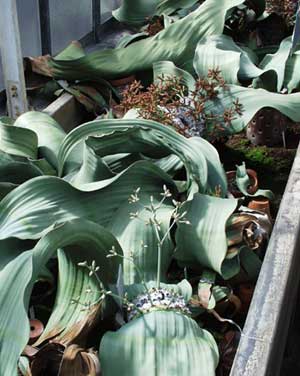Welwitschia mirabilis in Berlin-Dahlem
Besides the old and young Welwitschia plants in the display glasshouse, thirteen plants of old stock are growing in the Welwitschia house in the nursery (not open to the public for reasons of limited space). All were grown from seed. Trunk diameters measured in September 2000 were between 15 and 45 cm and leaf widths between 16 and 61 cm. Of the 13 plants, eight are producing male cones, four have at least once produced female cones, three have not flowered up to now (year 2001). A constant soil temperature of c. 26°C maintained in the glasshouse in the nursery has proved to be highly beneficial for successful growth and profuse flowering of our Welwitschia mirabilis. The Berlin-Dahlem horticulturist working with the Welwitschia collection at Berlin-Dahlem since 1964, Mr. Kurt Swiatkowiak was first to observe differences in flowering period and in male cone characters between individual plants among the simultaneously flowering male welwitschias of the old stock. His repeated observations on peduncle length, shape, and colour of the male cones led the author to attempt a closer look some years ago. However, the lack of exact documentation of origin of the plants of the old and presumably heterogeneous stock was a major impediment for a systematic approach to such a study. The observations suggested that the old Welwitschia stock at Berlin-Dahlem was composed of two groups of plants, provisionally denominated as "group 1" and "group 2". Only in 1999 and 2000, a search for more data on the origin of the seeds received from the Botanical gardens of Coimbra (seed origin Angola) and Kirstenbosch (seed origin Namibia) and a comparison with plants illustrated in literature and with herbarium material of known origin finally permitted to present results that throw new light on this often studied plant. A new subspecies, Welwitschia mirabilis subsp. namibiana was published in December 2001 in the journal Willdenowia. |
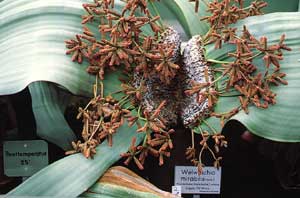 |
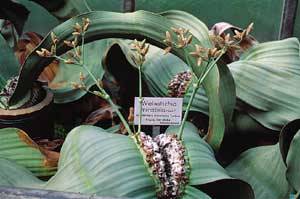 |
| Flowering male Welwitschia mirabilis subsp. mirabilis (plant nr. 2) in August 2000. | Flowering male Welwitschia mirabilis subsp. namibiana (plant nr. 6) in August 2000. |
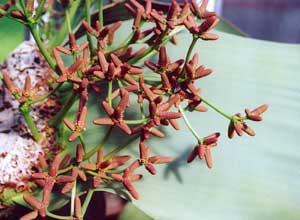 |
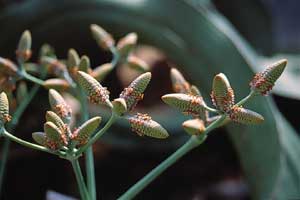 |
| Male cones of Welwitschia mirabilis subsp. mirabilis (plant nr. 2) in August 2000. | Male cones of Welwitschia mirabilis subsp. namibiana (plant nr. 6) in August 2000. |
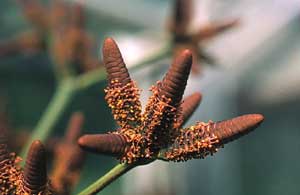 |
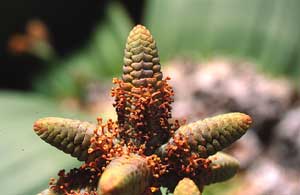 |
| Male cones of Welwitschia mirabilis subsp. mirabilis (plant nr. 12) in 1981. | Male cones of Welwitschia mirabilis subsp. namibiana (plant nr. 3) in September 2001. |
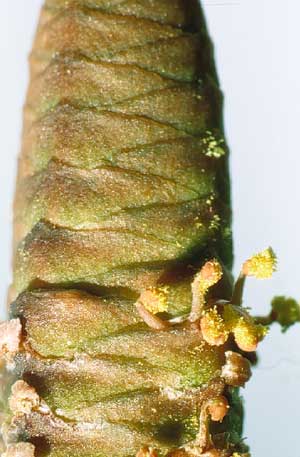 |
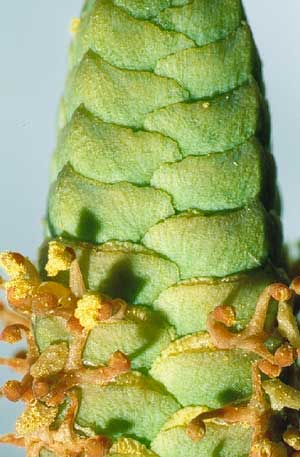 |
| Detail of male cone and flower of Welwitschia mirabilis subsp. mirabilis (plant nr. 9). | Detail of male cone and flower of Welwitschia mirabilis subsp. namibiana (plant nr. 6). |
| [Text: Beat Ernst Leuenberger] |
Continue the tour of the greenhouses...

